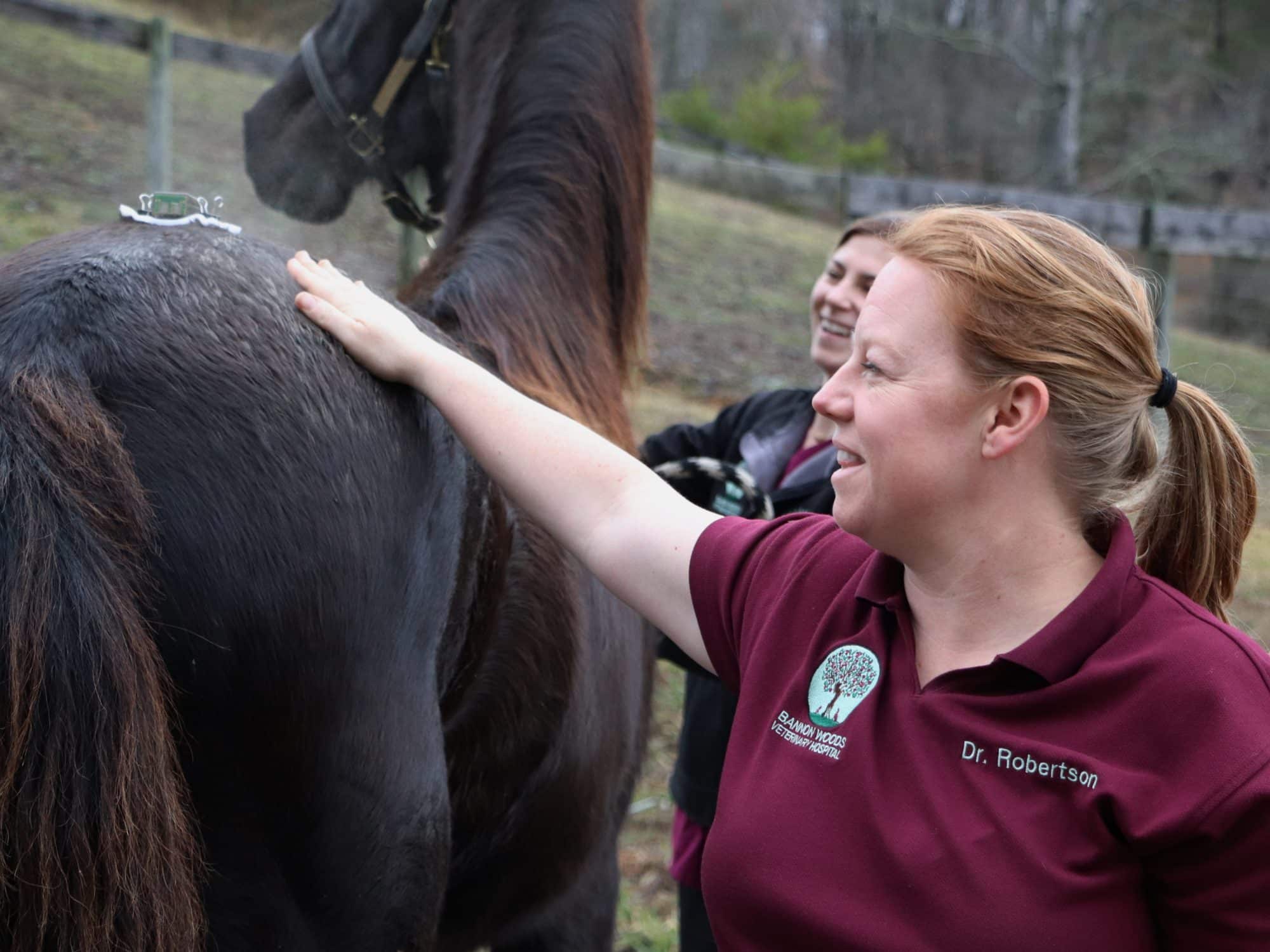Horse Vital Signs
(if you are unsure how to gather this information ask Dr. Robertson at your horses annual exam)
Temperature: 97-100.5
Pulse: (28-40 beats per minute)
Respiration: (12-20 beats per minute)
Mucous Membrane Color: pink
Capillary Refill Time: less than 2 seconds
Digital Pulse: should Not be bounding
Gastrointestinal sound (borborygmus): little to no sound is abnormal
Emergency Short List (when to call Immediately!!)
- Colic
- Dystocia (difficult birth)
- Eye issues (any!)
- Lacerations (wounds that require sutures should be stitched within 6 hours)
- Choke
Vaccine Recommendations
Spring:
Tetanus: Tetanus toxoid is the most important vaccine for horses because horses are
particularly susceptible to the paralyzing toxin produced by the bacterium Clostridium
tenani. Vaccination is highly efficacious in preventing the disease. There are two types pf
tetanus vaccination, toxiod and anti-toxin. Foals should be first inoculated with tetanus
toxoid at 4 months of age with a booster 3-4 weeks later. After that, annual boosters are
recommended through adulthood. Tetanus Anti-toxin, often given at birth, does not
invoke long term immunity.
Eastern and Western Encephalitis (sleeping sickness): These are highly fatal neurologic
diseases carried by insect vectors. The incidence of disease is not common for this region
however, these diseases have high morbidity (sickness) and high mortality (death)
associated with them. Vaccines routinely have both the Western and Eastern strains
combined with other diseases. The vaccination schedule is the same as tetanus toxoid,
and is typically given at the same time.
West Nile Virus: This is a neurologic disease that affects many different species, including
humans, horses, and birds. This virus is transmitted by the bite of mosquitoes, so there is
no direct horse to horse or horse to human transmission. Although this disease is rarely
fatal in humans, mortality rates in horses can reach up to 40 percent. Early vaccination,
before there is a wide outbreak, is recommended. The vaccination is given initially with a
booster 3-6 weeks later, and then annually thereafter. (Note: The ability to export a
horse to another country may be adversely affected due to the patients new seropositive
status.)
Equine Influenza and Equine Rhinoneumonitis (Herpes 1/4): Horses that travel or
have exposure to horses that travel should be vaccinated for Influenza and Rhino. Thease
respiratory diseases will often sweep through a barn and affect many horses at once but is
usually not fatal. Even though vaccination can not insure that a horses will not contract
the disease, horses that are vaccinated have lower levels of morbidity. The first dose may
be administered when the horse is older than 12 months because maternal antibodies from
the mare will interfere with the development of immunity in a foal with this particular
vaccination. Adults may be vaccinated every three months if needed. The frequency of
vaccination depends upon the horses age, risk factors of the environment, and the density
of the horse population surrounding the horse in question. Horses that show with USEF
are required to be vaccinated every 6 months.
Strangles: This upper respiratory disease, caused by Streptococcus equi, is highly
contagious when present on a farm. The disease is characterized by large abscesses
under the throat which can sometimes take weeks or months to resolve. Foals may be
vaccinated at 2-3 months with a booster 2-3 weeks later. Annual vaccination thereafter is
recommended. The newer intra-nasal vaccine is preferred over the previously available
intramuscular route.
Fall:
Equine Influenza
Botulism: This neuromuscular disease caused by either ingestion of bacterial spores or
from wound botulism. The bacteria causes a flaccid paralysis that is almost always fatal.
Owners usually first notice that their horse id having trouble eating due to a flaccid
tongue. Also, owners may notice that their horses tail is limp and flaccid as well. The
most likely source of contamination in horses is from feeding round bales. The carcass of
the carrier animal will be long gone out of your hay bale or round bale, but the spores left
behind are deadly. Foals over 6 months may be vaccinated. This vaccine requires an initial
booster series then an annual booster thereafter.
Rabies: This disease is always fatal and has a high level of public significance as human
exposure can be devastating. Skunks and raccoons are the primary carriers of rabies in
Kentucky. Foals may be vaccinated at 4 months of age with a booster 3-4 weeks later.
Annual boosters are recommended. Vaccination of pregnant mares is not recommended.
Potomac Horse Fever: This disease has recently become prevalent in Kentucky and has
sporadically shown up across our practice area. Potomac Horse fever is a rickettsial
disease that causes a high fever. Diarrhea likely accompanies this deadly disease and
founder. If the disease is diagnosed early horses have a high survival rate but since this
disease is still new to horse owners in the area the signs are not always noticed until it is
too late. Dr. Robertson recommends vaccination for this disease in the fall for farms that
are at increased risk.
Dentistry for your horse:
Your horse should receive a yearly dental exam. Adult horses need to have their teeth
floated on average once a year. Geriatric horses may need dental care every six months in
order to maintain a proper grinding surface.
Area Farriers
Tom Collier (502) 220-0801
Kevin J. Harnden (502) 655-9208
Bart Pickett: (502) 744-3866
Ritchie Wright: (502) 641-7749
Equine Insurance Providers
Smith Embry Insurance (502) 493-9911
Kelly Swanstrom (502) 727-2310

